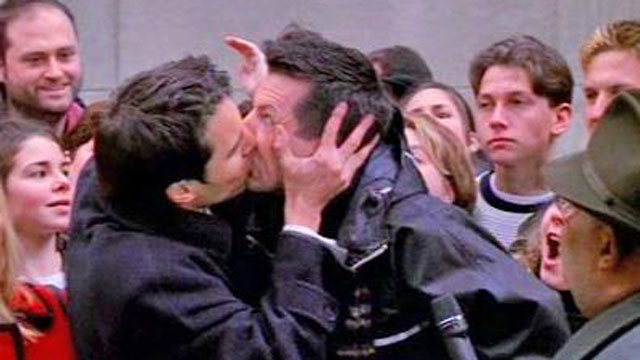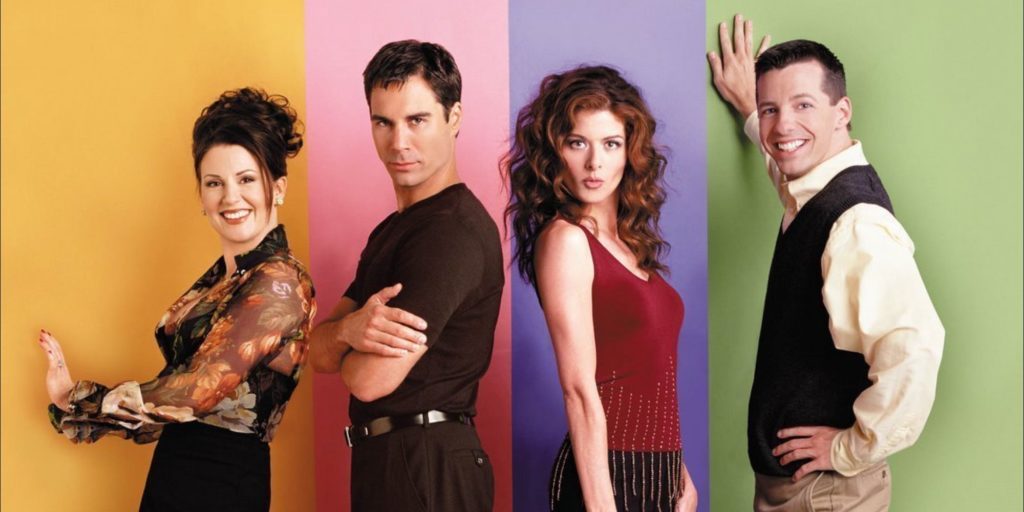As Will & Grace says goodbye for the second time, is its queer legacy as relevant as it once was?

Will & Grace is coming to an end, again. (NBC)
The Will & Grace finale airs Thursday (April 23), closing the door on an important but uneven LGBT+ legacy.
When Will & Grace debuted in 1998, the entertainment industry was still reeling from the aftermath of Ellen DeGeneres’ coming out.
From the moment the now-iconic “Puppy Episode” aired — making Ellen the first major gay sitcom character — the series was effectively put out to pasture, limping to a close a year later with DeGeneres’ career left in tatters thanks to widespread homophobia.
Just months later, a new show premiered with two gay characters in lead roles. And it was a hit.
Perhaps it was because, at the time, neither of the lead actors identified as gay (Sean Hayes [Jack] came out four years after the original Will & Grace finale). Or perhaps it was because both gay characters were men.
Whatever it was, the show was welcomed into the big leagues swiftly, becoming a cultural sensation, and a gay one at that.
Will & Grace has been widely credited with changing attitudes in America.
The show blazed a trail for gay representation. A second season episode included one of the first same-sex kisses on mainstream television (though – it should be noted – it wasn’t a romantic one), and while queer women weren’t featured as prominently, there were a few high-profile lesbian moments throughout the eight-year run.
Moreover, as the show progressed it gave its characters depth, showing that gay people are people, just like everybody else.
In 2012, six years after the show’s first goodbye, then-vice president Joe Biden noted just how impactful the series had been as he became the highest-ranking politician, at the time, to voice his support for same-sex marriage.
“I think Will & Grace did more to educate the American public more than almost anything anybody has done so far,” he said.
“People fear that which is different. Now they’re beginning to understand.”

In a very meta episode, Will and Jack kissed while protesting NBC, its real-life network, for cutting a same-sex kiss. (NBC)
Will & Grace returned in 2016, the era of Drag Race and Orange Is The New Black.
When the show returned for a 10-minute skit ahead of the 2016 presidential election, the TV landscape was a different place.
Countless shows had built on the legacy that Will & Grace left behind. RuPaul’s Drag Race had cemented itself as perhaps the biggest show in the world with a cast diverse in terms of expression and identity, if not gender; Orange Is The New Black was putting a Black trans character, played by a Black trans woman, in millions of living rooms around the world.
LGBT+ representation was coming to mean representation for the entire community – not just, as was the case in Will & Grace‘s era, cis gay white men.
By this time the show was being critiqued through a 2020 lens, with many noting how flawed it was in terms of diversity and in its reliance on stereotypes. Much like Friends it was a product of its time, which doesn’t excuse it completely, but gave many reason to allow it an easier ride than they would were it a current show.

The Will & Grace cast back in the show’s heyday. (NBC)
Which is why so many were excited when, in 2017, it was announced that a full-scale reboot was underway.
At the time Debra Messing said the new iteration would “absolutely do what Will & Grace always did, which is to be provocative and sassy and to make people laugh out loud by shinning a light on what’s happening right now in our country”.
She acknowledged that in its first run, “we really focused on LGB, and we stopped there at B” (which, in itself, is highly debatable).
“I know I want to continue through the alphabet, and I assume we will,” she vowed.
T, Q, I, sexual identity and gender identity, that’s what is being discussed right now in our culture.
Strictly speaking, Messing’s claim that the show never included the T isn’t true.
Back in 2000 the show’s sophomore run featured an episode in which Jack found himself turned on by a female stripper.
His fears that he might be turning straight – or as Grace quips, “lesbian” – were assuaged in a horrible punchline where the sex worker was revealed to be a trans woman.
Did Will & Grace ever make amends for this? In a word, no.
The only real discussion of gender in the rebooted series came in the current 11th and final season, which featured a gender reveal party.
If that sounds like a terrible premise, that’s because it is. What could have been an opportunity to flip the gender reveal concept on its head was wasted, and was instead used for cheap gags about genitals at the expense of intersex people.
“Will & Grace” was never my thing but kicking off last night’s episode with a gender reveal is some pretty cisnormative horseshit.
— Brian Dermody (@BrianDermody) March 21, 2020
The reboot also attempted to bring the B into the conversation, introducing a bisexual man who quickly became the butt of biphobic jokes.
Some interpreted this as an attempt at shining a light on prejudice, but largely the episode went down like a tonne of bricks with the bi+ community – though a plotline which finally delved into Karen’s fluid sexuality with the help of OITNB’s Smira Wiley was more warmly received, especially by queer women of colour.
genuinely appalled by the outright and disgusting biphobia on will & grace tonight. kinda hoped we’d be past this in 2020 tbh.
— lonely vampire ? (@deadgodspeed) April 3, 2020
As the second Will & Grace finale arrives, it’s hard to see where the reboot has extended its LGBT+ legacy. What could have been an opportunity to further representation and inclusion has, largely, been squandered.
Does this mean that its legacy is tarnished? That’s something which will likely be debated until the gang decide to get the show back on the road five or 10 years down the line. Some might say it was already stained by its lack of diversity, and they would have a very valid point.
But the fact remains that Will & Grace paved the way for everything from The L Word and Modern Family to Pose and Steven Universe, and was, in its initial form at least, truly groundbreaking. And despite its many flaws, that’s something to be commended.
The Will & Grace finale airs on Thursday (April 23) on NBC at 9/8c.

